Edie Melson's Blog, page 362
October 25, 2015
How Do I Finish Writing a Book?
by Brenda McGraw @BrendaMMcGraw
“Let each of you look not only to his own interests, but also to the interests of others.” Philippians 2:4 (ESV)
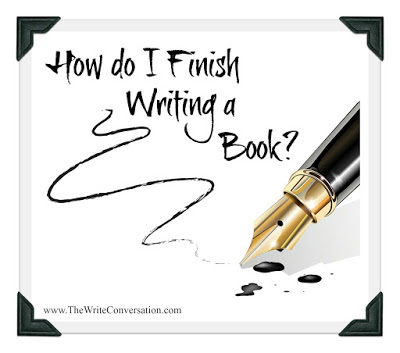 How do I finish writing a book?“How can I help you?” Those have been powerful words to me on this writing journey. We need each other, and realizing we are not alone is important to our growth.
How do I finish writing a book?“How can I help you?” Those have been powerful words to me on this writing journey. We need each other, and realizing we are not alone is important to our growth.
We need people on the path towards being an author.
Do you have a dream to be an author one day? Have you envisioned what that journey will look like?
I’m not sure exactly how I got here, other than taking one step and then another. Living in the writing world has changed my life. I’ve met some amazing people whom I might not have had I never pursued my calling to write a book.God has also given me the opportunity to inspire and encourage others to step out of their comfort zone. He may be stretching them beyond their discomfort to touch the lives of other people.
First, commit your work to the Lord. Our calling requires obedience, action and priority.
Do you want to write and finish a book? I add the word finish, because many people have the desire to write but many more never start, nor finish. I have noticed this as I talk to people day after day. I understand, because that is where I was 13 years ago when I first heard God speak to my spirit one day. He wanted me to write my story and told me that one day I would be speaking and writing.
There was a book inside me, but I had no idea what to do to make that a reality.
So I waited.
 Don't lose heart.Second, don’t lose heart. Second Corinthians 4:16 says, “. . . inwardly we are being renewed day by day.” Allow God to work in your heart and prepare you to be ready for His timing, as you follow your passion and purpose. God’s timing is always perfect.
Don't lose heart.Second, don’t lose heart. Second Corinthians 4:16 says, “. . . inwardly we are being renewed day by day.” Allow God to work in your heart and prepare you to be ready for His timing, as you follow your passion and purpose. God’s timing is always perfect.
Third, make your plans and goals. This is the means to get to an end, to finish.
Fourth, find a place and time to do your writing. The Lord will provide, if you seek His will and plans for your life. “And whatever you do, whether in word or deed, do it all in the name of the Lord Jesus, giving thanks to God the Father through Him.” Colossians 3:17 (NIV)
I dreamed and wondered if I would ever have a book, since God called me so long ago. Occasionally I would hear something in a message or someone would say a confirming word over the years of waiting. The wait is worth it. We don’t want to go before God; we want God to go before us.
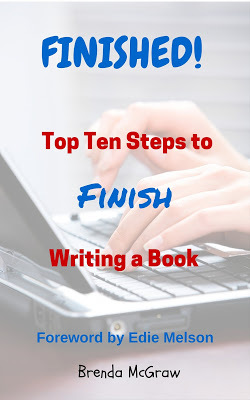 Finish! Top Ten Steps to Finish Writing a BookTo finish we have to begin, and to begin we have to focus on the finish line!—
Finished, Top Ten Steps to FinishWriting a Book
by Brenda McGraw.
Finish! Top Ten Steps to Finish Writing a BookTo finish we have to begin, and to begin we have to focus on the finish line!—
Finished, Top Ten Steps to FinishWriting a Book
by Brenda McGraw.
How can I help you take the next step?
I am offering one free hour of coaching to anyone who purchases my brand-new book, Finished, and emails his or her receipt to brendammcgraw@gmail.com. I will then send you an email with my scheduler to set up your appointment. You may also use it to just brainstorm or talk.
Are you ready to move forward and finish writing and publish the book inside of you? How can I pray for you?
In addition, we'll be giving away one free copy of Finished! Top 10 Steps to FINISH Writing a Book . Be sure to leave a comment below to be entered into the drawing!
TWEETABLE
How Do I Finish #Writing a Book - via @BrendaMMcGraw on @EdieMelson (Click to Tweet)
Brenda McGraw is an author and speaker who reveals how to discover joy beyond the clutter of life. She draws from her own life experiences in the #1 Amazon Best seller, “Joy Beyond, 28 Days to Finding Joy Beyond the Clutter of Life”. She is the founder of Ask God Today Ministries where she has a team of writers sharing truth and hope with others.
Brenda currently lives in South Carolina with her husband, Jeff and three of their five children. She is a survivor of breast cancer and a heart attack.. Despite the challenges she has endured, Brenda found peace through her relationship with Jesus Christ.
You can connect with Brenda at:Website - http://www.askgodtoday.com Amazon Author Page: http://www.amazon.com/Brenda-McGraw/e/B00GOIE7AG Twitter: https://www.twitter.com/BrendaMMcGraw
“Let each of you look not only to his own interests, but also to the interests of others.” Philippians 2:4 (ESV)
 How do I finish writing a book?“How can I help you?” Those have been powerful words to me on this writing journey. We need each other, and realizing we are not alone is important to our growth.
How do I finish writing a book?“How can I help you?” Those have been powerful words to me on this writing journey. We need each other, and realizing we are not alone is important to our growth. We need people on the path towards being an author.
Do you have a dream to be an author one day? Have you envisioned what that journey will look like?
I’m not sure exactly how I got here, other than taking one step and then another. Living in the writing world has changed my life. I’ve met some amazing people whom I might not have had I never pursued my calling to write a book.God has also given me the opportunity to inspire and encourage others to step out of their comfort zone. He may be stretching them beyond their discomfort to touch the lives of other people.
First, commit your work to the Lord. Our calling requires obedience, action and priority.
Do you want to write and finish a book? I add the word finish, because many people have the desire to write but many more never start, nor finish. I have noticed this as I talk to people day after day. I understand, because that is where I was 13 years ago when I first heard God speak to my spirit one day. He wanted me to write my story and told me that one day I would be speaking and writing.
There was a book inside me, but I had no idea what to do to make that a reality.
So I waited.
 Don't lose heart.Second, don’t lose heart. Second Corinthians 4:16 says, “. . . inwardly we are being renewed day by day.” Allow God to work in your heart and prepare you to be ready for His timing, as you follow your passion and purpose. God’s timing is always perfect.
Don't lose heart.Second, don’t lose heart. Second Corinthians 4:16 says, “. . . inwardly we are being renewed day by day.” Allow God to work in your heart and prepare you to be ready for His timing, as you follow your passion and purpose. God’s timing is always perfect.Third, make your plans and goals. This is the means to get to an end, to finish.
Fourth, find a place and time to do your writing. The Lord will provide, if you seek His will and plans for your life. “And whatever you do, whether in word or deed, do it all in the name of the Lord Jesus, giving thanks to God the Father through Him.” Colossians 3:17 (NIV)
I dreamed and wondered if I would ever have a book, since God called me so long ago. Occasionally I would hear something in a message or someone would say a confirming word over the years of waiting. The wait is worth it. We don’t want to go before God; we want God to go before us.
 Finish! Top Ten Steps to Finish Writing a BookTo finish we have to begin, and to begin we have to focus on the finish line!—
Finished, Top Ten Steps to FinishWriting a Book
by Brenda McGraw.
Finish! Top Ten Steps to Finish Writing a BookTo finish we have to begin, and to begin we have to focus on the finish line!—
Finished, Top Ten Steps to FinishWriting a Book
by Brenda McGraw.How can I help you take the next step?
I am offering one free hour of coaching to anyone who purchases my brand-new book, Finished, and emails his or her receipt to brendammcgraw@gmail.com. I will then send you an email with my scheduler to set up your appointment. You may also use it to just brainstorm or talk.
Are you ready to move forward and finish writing and publish the book inside of you? How can I pray for you?
In addition, we'll be giving away one free copy of Finished! Top 10 Steps to FINISH Writing a Book . Be sure to leave a comment below to be entered into the drawing!
TWEETABLE
How Do I Finish #Writing a Book - via @BrendaMMcGraw on @EdieMelson (Click to Tweet)
Brenda McGraw is an author and speaker who reveals how to discover joy beyond the clutter of life. She draws from her own life experiences in the #1 Amazon Best seller, “Joy Beyond, 28 Days to Finding Joy Beyond the Clutter of Life”. She is the founder of Ask God Today Ministries where she has a team of writers sharing truth and hope with others.
Brenda currently lives in South Carolina with her husband, Jeff and three of their five children. She is a survivor of breast cancer and a heart attack.. Despite the challenges she has endured, Brenda found peace through her relationship with Jesus Christ.
You can connect with Brenda at:Website - http://www.askgodtoday.com Amazon Author Page: http://www.amazon.com/Brenda-McGraw/e/B00GOIE7AG Twitter: https://www.twitter.com/BrendaMMcGraw
Published on October 25, 2015 01:00
October 24, 2015
Write with Abandon
So often with pick our writing to pieces before it has time to mature. This post and quote from Alton Gansky reminded me that there is a proper order to things.
 "Write with Abandon, Edit with Discipline." -Alton Gansky
"Write with Abandon, Edit with Discipline." -Alton Gansky
Be sure to share your thoughts in the comments section below.
I invite you to use this image any way you like online. Post it to your blog, share it on Facebook, Twitter, Pinterest, anywhere you'd like. All I ask is that you keep it intact, with my website watermark visible.
Don't forget to join the conversation!Blessings,Edie
TWEETABLE
"Write with abandon..." a quote from @AltonGansky on @EdieMelson (Click to Tweet)
 "Write with Abandon, Edit with Discipline." -Alton Gansky
"Write with Abandon, Edit with Discipline." -Alton GanskyBe sure to share your thoughts in the comments section below.
I invite you to use this image any way you like online. Post it to your blog, share it on Facebook, Twitter, Pinterest, anywhere you'd like. All I ask is that you keep it intact, with my website watermark visible.
Don't forget to join the conversation!Blessings,Edie
TWEETABLE
"Write with abandon..." a quote from @AltonGansky on @EdieMelson (Click to Tweet)
Published on October 24, 2015 01:00
October 23, 2015
Do You Pray about Your Writing?
by Lori Hatcher @LoriHatcher2
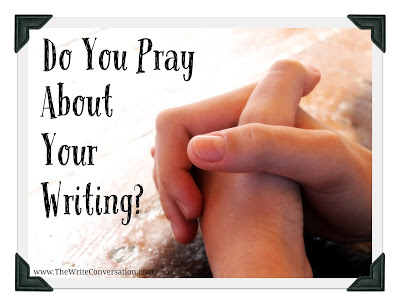 “It seems easier to go to a consistent extreme than to live at the center of biblical tension.”
“It seems easier to go to a consistent extreme than to live at the center of biblical tension.”
These wise words from Robertson McQuilkin, president emeritus of Columbia International University voice the struggle we face every day as writers—finding the balance between working and praying. Last month I challenged you that prayer (for opportunities, inspiration, book contracts) is no substitute for not working hard (Write Hard, Pray Harder). Today, I’d like to challenge you that working hard is no excuse for not praying.I’m a Type A firstborn whose love language is acts of service. I love checking off boxes, crossing items off my To Do list, and filling my day with meaningful tasks. Action is my middle name and “Sit still,” is the most cruel request you can make of me. Many days you’ll find me standing at my computer in an effort to make writing less sedentary.
Because I’m a DO-er, I used to have difficulty sitting still long enough to pray. Then I discovered I can pray while walking, folding laundry, washing dishes . . . well, you get the picture. I also discovered that unless the Lord builds the house (and this includes my writing “house”), they labor in vain that build it (Psa. 127:1).
 I noticed that the more I prayed about my writing and speaking, the more exciting things began to happen. I’d find inspiration in unexpected places. I’d connect with someone through a seemingly random set of circumstances that would bring about a writing or speaking opportunity. I’d be invited to guest blog or contribute to a website. A publication would ask to reprint one of my articles.
I noticed that the more I prayed about my writing and speaking, the more exciting things began to happen. I’d find inspiration in unexpected places. I’d connect with someone through a seemingly random set of circumstances that would bring about a writing or speaking opportunity. I’d be invited to guest blog or contribute to a website. A publication would ask to reprint one of my articles.
Instead of wasting time by praying every morning, I began to invest time in my writing and speaking ministry by bringing my needs and requests before the Lord and asking him to meet them.
Here are four ways you can pray about your writing career:Before you read your Bible each morning, ask God to give you insight and understanding to apply what you’re reading to your current work in progress.Keep a list of agents, editors, and publishing houses to which you or your agent has submitted your manuscript. Pray for them by name. Ask God to direct your project to the right publisher. Ask him to give the editors and agents supernatural wisdom and discernment to make the best decision about your submission. Tell God you’ll trust his direction and be willing to accept both open and closed doors as his will for your work.Write a list of dreams/goals for your writing life. Don’t be afraid to dream big. James 4:2 reminds us, “You have not because you ask not.” Like a loving father, God will wisely answer each request and lend his power to your efforts.Pray specifically. Two years ago, I asked the Lord to open the door for me to teach at Blue Ridge Mountain Christian Writers Conference. In May of 2015, God answered my prayer. Now I have a list of writers’ conferences I’m praying about. Each day I pray through the list and ask God to bless the conference directors and give them wisdom to know who can minister best to their conferees.
If you feel like your writing career is going nowhere, I challenge you to give prayer a chance. I can confidently say you’ll be amazed at what happens. If you pray about your writing career, tell us about it in a comment below.
TWEETABLES4 ways you can #pray for your #writing career - @LoriHatcher2 on @EdieMelson (Click to Tweet)
Do You #Pray About Your #Writing? Thoughts from author @LoriHatcher2 on @EdieMelson (Click to Tweet)
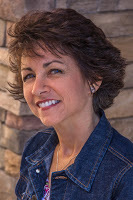 Lori Hatcher is the editor of
Reach Out, Columbia
magazine and the author of two devotional books. Her second book,
Hungry for God…Starving for Time, 5-Minute Devotions for Busy Women
released in December. A blogger, writing instructor, and women’s ministry speaker, her goal is to help women connect with God in the craziness of life. You’ll find her pondering the marvelous and the mundane on her blog,
Hungry for God…Starving for Time
. Connect with her on Facebook, Twitter (@LoriHatcher2), or Pinterest (Hungry for God).
Lori Hatcher is the editor of
Reach Out, Columbia
magazine and the author of two devotional books. Her second book,
Hungry for God…Starving for Time, 5-Minute Devotions for Busy Women
released in December. A blogger, writing instructor, and women’s ministry speaker, her goal is to help women connect with God in the craziness of life. You’ll find her pondering the marvelous and the mundane on her blog,
Hungry for God…Starving for Time
. Connect with her on Facebook, Twitter (@LoriHatcher2), or Pinterest (Hungry for God).
 “It seems easier to go to a consistent extreme than to live at the center of biblical tension.”
“It seems easier to go to a consistent extreme than to live at the center of biblical tension.” These wise words from Robertson McQuilkin, president emeritus of Columbia International University voice the struggle we face every day as writers—finding the balance between working and praying. Last month I challenged you that prayer (for opportunities, inspiration, book contracts) is no substitute for not working hard (Write Hard, Pray Harder). Today, I’d like to challenge you that working hard is no excuse for not praying.I’m a Type A firstborn whose love language is acts of service. I love checking off boxes, crossing items off my To Do list, and filling my day with meaningful tasks. Action is my middle name and “Sit still,” is the most cruel request you can make of me. Many days you’ll find me standing at my computer in an effort to make writing less sedentary.
Because I’m a DO-er, I used to have difficulty sitting still long enough to pray. Then I discovered I can pray while walking, folding laundry, washing dishes . . . well, you get the picture. I also discovered that unless the Lord builds the house (and this includes my writing “house”), they labor in vain that build it (Psa. 127:1).
 I noticed that the more I prayed about my writing and speaking, the more exciting things began to happen. I’d find inspiration in unexpected places. I’d connect with someone through a seemingly random set of circumstances that would bring about a writing or speaking opportunity. I’d be invited to guest blog or contribute to a website. A publication would ask to reprint one of my articles.
I noticed that the more I prayed about my writing and speaking, the more exciting things began to happen. I’d find inspiration in unexpected places. I’d connect with someone through a seemingly random set of circumstances that would bring about a writing or speaking opportunity. I’d be invited to guest blog or contribute to a website. A publication would ask to reprint one of my articles.Instead of wasting time by praying every morning, I began to invest time in my writing and speaking ministry by bringing my needs and requests before the Lord and asking him to meet them.
Here are four ways you can pray about your writing career:Before you read your Bible each morning, ask God to give you insight and understanding to apply what you’re reading to your current work in progress.Keep a list of agents, editors, and publishing houses to which you or your agent has submitted your manuscript. Pray for them by name. Ask God to direct your project to the right publisher. Ask him to give the editors and agents supernatural wisdom and discernment to make the best decision about your submission. Tell God you’ll trust his direction and be willing to accept both open and closed doors as his will for your work.Write a list of dreams/goals for your writing life. Don’t be afraid to dream big. James 4:2 reminds us, “You have not because you ask not.” Like a loving father, God will wisely answer each request and lend his power to your efforts.Pray specifically. Two years ago, I asked the Lord to open the door for me to teach at Blue Ridge Mountain Christian Writers Conference. In May of 2015, God answered my prayer. Now I have a list of writers’ conferences I’m praying about. Each day I pray through the list and ask God to bless the conference directors and give them wisdom to know who can minister best to their conferees.
If you feel like your writing career is going nowhere, I challenge you to give prayer a chance. I can confidently say you’ll be amazed at what happens. If you pray about your writing career, tell us about it in a comment below.
TWEETABLES4 ways you can #pray for your #writing career - @LoriHatcher2 on @EdieMelson (Click to Tweet)
Do You #Pray About Your #Writing? Thoughts from author @LoriHatcher2 on @EdieMelson (Click to Tweet)
 Lori Hatcher is the editor of
Reach Out, Columbia
magazine and the author of two devotional books. Her second book,
Hungry for God…Starving for Time, 5-Minute Devotions for Busy Women
released in December. A blogger, writing instructor, and women’s ministry speaker, her goal is to help women connect with God in the craziness of life. You’ll find her pondering the marvelous and the mundane on her blog,
Hungry for God…Starving for Time
. Connect with her on Facebook, Twitter (@LoriHatcher2), or Pinterest (Hungry for God).
Lori Hatcher is the editor of
Reach Out, Columbia
magazine and the author of two devotional books. Her second book,
Hungry for God…Starving for Time, 5-Minute Devotions for Busy Women
released in December. A blogger, writing instructor, and women’s ministry speaker, her goal is to help women connect with God in the craziness of life. You’ll find her pondering the marvelous and the mundane on her blog,
Hungry for God…Starving for Time
. Connect with her on Facebook, Twitter (@LoriHatcher2), or Pinterest (Hungry for God).
Published on October 23, 2015 01:00
October 22, 2015
Writers Facing Criticism
by Henry McLaughlin @RiverBendSagas
If you ignore criticism, you will end in poverty and disgrace; if you accept correction, you will be honored. Psalm 13:18 NLT
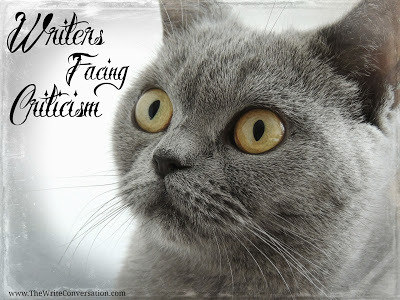 One of the hardest things for writers is facing criticism.One of the hardest things for a writer to learn is to receiving criticism and correction. Unfortunately, some never do.
One of the hardest things for writers is facing criticism.One of the hardest things for a writer to learn is to receiving criticism and correction. Unfortunately, some never do.
James Scott Bell refers to it as growing a rhino skin. Jerry B. Jenkins advises authors to develop a thick skin.
This doesn’t mean we make ourselves immune to criticism.
It means we make the time to develop the attitude of receiving criticism without personalizing it. We look at criticism and correction as ways to improve our work.
 God doesn't give us the words. He gives us the inspiration.God doesn’t give us the words. He gives us the inspiration. We give him our obedience and our talent. Part of our obedience is to learn the craft and to work to make our writing the best it can be.
God doesn't give us the words. He gives us the inspiration.God doesn’t give us the words. He gives us the inspiration. We give him our obedience and our talent. Part of our obedience is to learn the craft and to work to make our writing the best it can be.
This means being open to changing it. Not just our own tweaking, either. We need to show our work to others for constructive and useful feedback.
We need to learn to accept correction. When I began this crazy journey of writing, I had to learn to swallow my pride and my ego. And I needed to learn to overcome my fear: fear of rejection, of failure, of being ridiculed for even thinking I could write.
God led me to the right early critiquers, people who knew how to give correction with an eye to improving.
My advice: Seek the perspective of different eyes reading our words, of offering suggestions to make it better. We don’t have to apply every suggestion. Learn to discern what’s valid and what isn’t.
Pray and trust God to lead us to the right critiquers for us: those who have our best interests at heart, those who want to help us grow as writers.
How has having others give feedback improved your writing?
TWEETABLESGod doesn't give us the words—He gives us the inspiration - Henry McLaughlin, @riverbendsagas (Click to Tweet)
One of the hardest things for writers is facing criticism - thoughts from author Henry McLaughlin (Click to Tweet)
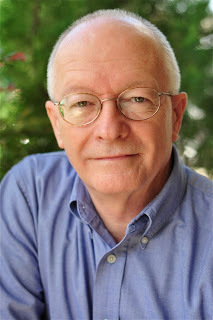 Henry’s debut novel, Journey to Riverbend, won the 2009 Operation First Novel contest.
Henry’s debut novel, Journey to Riverbend, won the 2009 Operation First Novel contest.
He serves as Associate Director of North Texas Christian Writers.
Henry edits novels, leads critique groups, and teaches at conferences and workshops. He enjoys mentoring and coaching individual writers.
Connect with Henry on his blog, Twitter and Facebook.
If you ignore criticism, you will end in poverty and disgrace; if you accept correction, you will be honored. Psalm 13:18 NLT
 One of the hardest things for writers is facing criticism.One of the hardest things for a writer to learn is to receiving criticism and correction. Unfortunately, some never do.
One of the hardest things for writers is facing criticism.One of the hardest things for a writer to learn is to receiving criticism and correction. Unfortunately, some never do.James Scott Bell refers to it as growing a rhino skin. Jerry B. Jenkins advises authors to develop a thick skin.
This doesn’t mean we make ourselves immune to criticism.
It means we make the time to develop the attitude of receiving criticism without personalizing it. We look at criticism and correction as ways to improve our work.
 God doesn't give us the words. He gives us the inspiration.God doesn’t give us the words. He gives us the inspiration. We give him our obedience and our talent. Part of our obedience is to learn the craft and to work to make our writing the best it can be.
God doesn't give us the words. He gives us the inspiration.God doesn’t give us the words. He gives us the inspiration. We give him our obedience and our talent. Part of our obedience is to learn the craft and to work to make our writing the best it can be. This means being open to changing it. Not just our own tweaking, either. We need to show our work to others for constructive and useful feedback.
We need to learn to accept correction. When I began this crazy journey of writing, I had to learn to swallow my pride and my ego. And I needed to learn to overcome my fear: fear of rejection, of failure, of being ridiculed for even thinking I could write.
God led me to the right early critiquers, people who knew how to give correction with an eye to improving.
My advice: Seek the perspective of different eyes reading our words, of offering suggestions to make it better. We don’t have to apply every suggestion. Learn to discern what’s valid and what isn’t.
Pray and trust God to lead us to the right critiquers for us: those who have our best interests at heart, those who want to help us grow as writers.
How has having others give feedback improved your writing?
TWEETABLESGod doesn't give us the words—He gives us the inspiration - Henry McLaughlin, @riverbendsagas (Click to Tweet)
One of the hardest things for writers is facing criticism - thoughts from author Henry McLaughlin (Click to Tweet)
 Henry’s debut novel, Journey to Riverbend, won the 2009 Operation First Novel contest.
Henry’s debut novel, Journey to Riverbend, won the 2009 Operation First Novel contest. He serves as Associate Director of North Texas Christian Writers.
Henry edits novels, leads critique groups, and teaches at conferences and workshops. He enjoys mentoring and coaching individual writers.
Connect with Henry on his blog, Twitter and Facebook.
Published on October 22, 2015 01:00
October 21, 2015
For Non-fiction Authors: Tips for Choosing the Right Story
by Katy Kauffman @KatyKauffman28
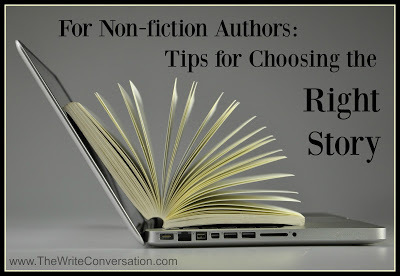 Tips for Choosing the Right StoryStories are powerful tools for the non-fiction writer. They grab the reader’s attention, add personality to your writing, and illustrate the point you’re trying to make. Whether you’re writing a blog post, an article, or a book, how do you know whichstory is the best to use?
Tips for Choosing the Right StoryStories are powerful tools for the non-fiction writer. They grab the reader’s attention, add personality to your writing, and illustrate the point you’re trying to make. Whether you’re writing a blog post, an article, or a book, how do you know whichstory is the best to use?
I don’t how many times I’ve spent hours researching details for a story, only to end up choosing a different angle. But the time was well spent. Writing is a process of trying and failing and finding what works. The five hours it can take to write one article becomes five minutes of inspiration and encouragement for the reader, inspiration that impacts their daily living. So perhaps I can help you streamline the time it takes to pick the right story. Ask yourself 5 questions when you find a good story online or recall one from your own life.
1. Does the story relate well to my topic?Don’t just pick a story youwant to share—pick the story that best relates to your point. If you find a story you love but is not on topic, print it and put it in a special folder, or save it to a folder on your computer called “Story Archive” or something more fun like “My Story Treasure Chest.” Then you can still use the story later!
 Is the mood the same?2. Does the story have the same mood as the rest of my writing?Each story emits a particular mood or “vibe.” See if the story’s mood matches the mood of your writing—is it encouraging, somber, funny, or satirical?
Is the mood the same?2. Does the story have the same mood as the rest of my writing?Each story emits a particular mood or “vibe.” See if the story’s mood matches the mood of your writing—is it encouraging, somber, funny, or satirical?
3. Is the story believable?For stories you find online, verify the source as credible, and cite any amazing facts or specific statistics. For example, in my latest book I used the speed of Usain Bolt, the fastest man alive, to show how quickly we need to turn from temptation. I cited the fact that he could run 26.7 mph so my book remained credible and so readers could check out the story for themselves.
 Does it have enough spiritual relevance and impact?4. Does the story have enough spiritual relevance and impact?If you are writing about a spiritual principle, make sure the story you select is strong enough to support your point. Is it a big enough diving board for the reader to use to jump into a spiritual mindset and dive into your principle? Think “parable.”
Does it have enough spiritual relevance and impact?4. Does the story have enough spiritual relevance and impact?If you are writing about a spiritual principle, make sure the story you select is strong enough to support your point. Is it a big enough diving board for the reader to use to jump into a spiritual mindset and dive into your principle? Think “parable.”
5. Is the story memorable?Can the reader picture the story happening? Write it like a storyteller would relate it. Choose a scenario that will stir the readers’ emotions, relate an interesting fact, picture a surprising turn of events, put a new twist on an object or a scene they see every day, or recount the path someone took to restoration. Stories of tragedy and triumph are especially memorable, and give us hope.
I may not be able to remember my pastor’s three-point sermons verbatim every week, but I can usually remember the stories he used. Pick a memorable story that will encourage readers and stir them to action long after they’ve closed your book or turned off their computers.
How do you pick the best stories for your writing? Tell us, and join the conversation!
TWEETABLESNon-Fiction Authors: Tips for Choosing the Right Story - @KatyKauffman28 (Click to Tweet)
Stories add powerful impact for non-fiction, find the right ones - @KatyKauffman28 (Click to Tweet)
 Katy Kauffman is an award-winning writer and a co-founder of Lighthouse Bible Studies, a ministry which seeks to connect people to God through His Word. She has taught the Bible to women and teens, and has two published Bible studies for women, 2 Timothy: Winning the Victoryand Faith, Courage, and Victory. She is an editor of the new Refresh Bible Study Magazine and the designer of Broken but Priceless: The Magazine. She makes her home near Atlanta, Georgia.
Katy Kauffman is an award-winning writer and a co-founder of Lighthouse Bible Studies, a ministry which seeks to connect people to God through His Word. She has taught the Bible to women and teens, and has two published Bible studies for women, 2 Timothy: Winning the Victoryand Faith, Courage, and Victory. She is an editor of the new Refresh Bible Study Magazine and the designer of Broken but Priceless: The Magazine. She makes her home near Atlanta, Georgia.
 Tips for Choosing the Right StoryStories are powerful tools for the non-fiction writer. They grab the reader’s attention, add personality to your writing, and illustrate the point you’re trying to make. Whether you’re writing a blog post, an article, or a book, how do you know whichstory is the best to use?
Tips for Choosing the Right StoryStories are powerful tools for the non-fiction writer. They grab the reader’s attention, add personality to your writing, and illustrate the point you’re trying to make. Whether you’re writing a blog post, an article, or a book, how do you know whichstory is the best to use?I don’t how many times I’ve spent hours researching details for a story, only to end up choosing a different angle. But the time was well spent. Writing is a process of trying and failing and finding what works. The five hours it can take to write one article becomes five minutes of inspiration and encouragement for the reader, inspiration that impacts their daily living. So perhaps I can help you streamline the time it takes to pick the right story. Ask yourself 5 questions when you find a good story online or recall one from your own life.
1. Does the story relate well to my topic?Don’t just pick a story youwant to share—pick the story that best relates to your point. If you find a story you love but is not on topic, print it and put it in a special folder, or save it to a folder on your computer called “Story Archive” or something more fun like “My Story Treasure Chest.” Then you can still use the story later!
 Is the mood the same?2. Does the story have the same mood as the rest of my writing?Each story emits a particular mood or “vibe.” See if the story’s mood matches the mood of your writing—is it encouraging, somber, funny, or satirical?
Is the mood the same?2. Does the story have the same mood as the rest of my writing?Each story emits a particular mood or “vibe.” See if the story’s mood matches the mood of your writing—is it encouraging, somber, funny, or satirical?3. Is the story believable?For stories you find online, verify the source as credible, and cite any amazing facts or specific statistics. For example, in my latest book I used the speed of Usain Bolt, the fastest man alive, to show how quickly we need to turn from temptation. I cited the fact that he could run 26.7 mph so my book remained credible and so readers could check out the story for themselves.
 Does it have enough spiritual relevance and impact?4. Does the story have enough spiritual relevance and impact?If you are writing about a spiritual principle, make sure the story you select is strong enough to support your point. Is it a big enough diving board for the reader to use to jump into a spiritual mindset and dive into your principle? Think “parable.”
Does it have enough spiritual relevance and impact?4. Does the story have enough spiritual relevance and impact?If you are writing about a spiritual principle, make sure the story you select is strong enough to support your point. Is it a big enough diving board for the reader to use to jump into a spiritual mindset and dive into your principle? Think “parable.”5. Is the story memorable?Can the reader picture the story happening? Write it like a storyteller would relate it. Choose a scenario that will stir the readers’ emotions, relate an interesting fact, picture a surprising turn of events, put a new twist on an object or a scene they see every day, or recount the path someone took to restoration. Stories of tragedy and triumph are especially memorable, and give us hope.
I may not be able to remember my pastor’s three-point sermons verbatim every week, but I can usually remember the stories he used. Pick a memorable story that will encourage readers and stir them to action long after they’ve closed your book or turned off their computers.
How do you pick the best stories for your writing? Tell us, and join the conversation!
TWEETABLESNon-Fiction Authors: Tips for Choosing the Right Story - @KatyKauffman28 (Click to Tweet)
Stories add powerful impact for non-fiction, find the right ones - @KatyKauffman28 (Click to Tweet)
 Katy Kauffman is an award-winning writer and a co-founder of Lighthouse Bible Studies, a ministry which seeks to connect people to God through His Word. She has taught the Bible to women and teens, and has two published Bible studies for women, 2 Timothy: Winning the Victoryand Faith, Courage, and Victory. She is an editor of the new Refresh Bible Study Magazine and the designer of Broken but Priceless: The Magazine. She makes her home near Atlanta, Georgia.
Katy Kauffman is an award-winning writer and a co-founder of Lighthouse Bible Studies, a ministry which seeks to connect people to God through His Word. She has taught the Bible to women and teens, and has two published Bible studies for women, 2 Timothy: Winning the Victoryand Faith, Courage, and Victory. She is an editor of the new Refresh Bible Study Magazine and the designer of Broken but Priceless: The Magazine. She makes her home near Atlanta, Georgia.
Published on October 21, 2015 01:00
October 20, 2015
Good Writing is All in the Details
by Lucinda S McDowell @LucindaSMcDowel
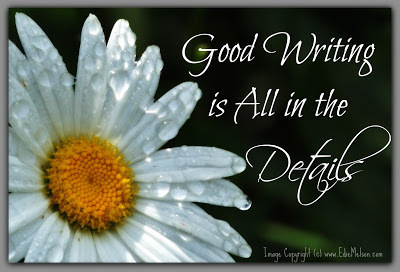 Just because you write non-fiction doesn’t mean you can’t be a good storyteller.
Just because you write non-fiction doesn’t mean you can’t be a good storyteller.
In fact, I heartily advocate using all the elements of fiction in your writing. This is often called “narrative non-fiction” and employs good storytelling in order to offer an important takeaway.
While strong characterization, dialogue, and context are important, the key is in the details. Details are what help a writer to heed the advice of “Show, don’t tell.”
What does this mean to a writer?“It means learning how to use descriptive details to give your story a sense of time and place and an emotional tone that will help readers feel what is going on the story as you relate it,” says writing expert Biff Barnes.
The key is to be specific.
 For instance, compare these two sentences:I walked to my truck that morning and drove to work.The sun had barely made an appearance and it was in that in-between time of faint light peeking through the darkness that I wearily shuffled out to my beat-up red pickup truck, wondering yet again if those worn tires would get me to work before the shift bell rang.
For instance, compare these two sentences:I walked to my truck that morning and drove to work.The sun had barely made an appearance and it was in that in-between time of faint light peeking through the darkness that I wearily shuffled out to my beat-up red pickup truck, wondering yet again if those worn tires would get me to work before the shift bell rang.
Both sentences get me to my truck and off to work.
But which one tells you more of the story? Obviously, #2 with many more details:It’s barely morning – crack o’dawn.I’m tired and not all that eager to go.My vehicle is an old truck with worn tires.I do shift work and can’t afford to be late.
We communicate more clearly when we use the right words – not just “I walked to my truck,” but “I wearily shuffled.” Descriptive words. That’s why developing a wide vocabulary is important!
Don’t just tell about the beautiful evening by the shore. Help your readers experience it the way you did—involve their senses. Is it warm? Is there a breeze? Can you hear waves lapping on the shore? What music comes from the nearby restaurant? And why do the smells make you suddenly hungry for fish and chips?
But in order to provide details in your non-fiction story you must be a person who chooses to notice.
 To be attentive to life. To slow down long enough to observe the details of what and who surround you. And then to filter those details through your own mind so that you can portray them realistically, empathetically or critically to others, depending on what you are communicating.
To be attentive to life. To slow down long enough to observe the details of what and who surround you. And then to filter those details through your own mind so that you can portray them realistically, empathetically or critically to others, depending on what you are communicating.
This week a friend of mine died of cancer. Now, if I were writing about some of the spiritual and practical lessons I learned while walking with her through this process, I might utilize the narrative non-fiction format of storytelling. I would present dialogue, scenery, and characterization, to help make you feel that you are there with me in the hospital as I visit her. So that you totally understand my frustration when I say or do the wrong thing. My despair at not being able to comfort her grieving family. And by my giving details, you the reader will take away some of the very lessons I learned in this real life experience. But perhaps you will learn it better through story than through a bulleted how-to article.
But there’s no way I can be the kind of writer who offers this to my reader unless I am the kind of person who assimilates life through noticing. Taking time to filter and process. That’s why good writers are deliberate and focus on others. That’s why we choose to relish the moments and to listen and to look deeper.
I cannot be a writer of details if I am always on the run.
Our readers don’t want us to tell them how to feel something or even what to feel. They want us to help them experience the situation so vividly that the lesson or emotion is naturally awakened within them.
Author Cec Murphey says that we “show” (not tell) when we present a picture to our readers. “Good writing draws a picture for us and pulls us into the scene. Good writing is subtle. I can insert one simple detail and it conveys more than a paragraph of telling statements.”
Learn how to develop details in your writing. Take a walk and be especially attentive to all around you. Jot down what every sense experienced. Watch people and practice describing them with precision, not just what they’re wearing, but their demeanor or attitude.
You will not only become a better storyteller, but perhaps a kinder person as well.
“Our life story is multilayered and filled with wonder;our task is to stop our activity long enough to notice the details.”
– Vinita Hampton WrightTWEETABLES"I cannot be a writer of details if I'm always on the run." @LucindaSMcDowel (Click to Tweet)
Good #Writing is All in the Details - via @LucindaSMcDowel on @EdieMelson (Click to Tweet)
 Lucinda Secrest McDowell, M.T.S., is the author of 11 books, contributing author to 25 books, and has published in more than 50 magazines. A graduate of Gordon-Conwell Theological Seminary and Furman University, she studied at the Wheaton Graduate School of Communication and served as Communications Specialist for the Lausanne Committee for World Evangelization (Thailand) and Editor for Billy Graham’s International Conference for Itinerant Evangelists (Netherlands). A member of Advanced Writers and Speakers Association (AWSA), she has received “Writer of the Year” awards from both Mt. Hermon and Blue Ridge Writers Conferences. Cindy speaks internationally through her ministry “Encouraging Words” and co-directs the New England Christian Writers Retreat. Known for her ability to convey deep truth in practical and winsome ways, she writes from “Sunnyside” cottage in New England. Visit her online at www.EncouragingWords.net
Lucinda Secrest McDowell, M.T.S., is the author of 11 books, contributing author to 25 books, and has published in more than 50 magazines. A graduate of Gordon-Conwell Theological Seminary and Furman University, she studied at the Wheaton Graduate School of Communication and served as Communications Specialist for the Lausanne Committee for World Evangelization (Thailand) and Editor for Billy Graham’s International Conference for Itinerant Evangelists (Netherlands). A member of Advanced Writers and Speakers Association (AWSA), she has received “Writer of the Year” awards from both Mt. Hermon and Blue Ridge Writers Conferences. Cindy speaks internationally through her ministry “Encouraging Words” and co-directs the New England Christian Writers Retreat. Known for her ability to convey deep truth in practical and winsome ways, she writes from “Sunnyside” cottage in New England. Visit her online at www.EncouragingWords.net
Links www.NewEnglandChristianWritersRetreat.comBlog/website www.EncouragingWords.net
 Just because you write non-fiction doesn’t mean you can’t be a good storyteller.
Just because you write non-fiction doesn’t mean you can’t be a good storyteller. In fact, I heartily advocate using all the elements of fiction in your writing. This is often called “narrative non-fiction” and employs good storytelling in order to offer an important takeaway.
While strong characterization, dialogue, and context are important, the key is in the details. Details are what help a writer to heed the advice of “Show, don’t tell.”
What does this mean to a writer?“It means learning how to use descriptive details to give your story a sense of time and place and an emotional tone that will help readers feel what is going on the story as you relate it,” says writing expert Biff Barnes.
The key is to be specific.
 For instance, compare these two sentences:I walked to my truck that morning and drove to work.The sun had barely made an appearance and it was in that in-between time of faint light peeking through the darkness that I wearily shuffled out to my beat-up red pickup truck, wondering yet again if those worn tires would get me to work before the shift bell rang.
For instance, compare these two sentences:I walked to my truck that morning and drove to work.The sun had barely made an appearance and it was in that in-between time of faint light peeking through the darkness that I wearily shuffled out to my beat-up red pickup truck, wondering yet again if those worn tires would get me to work before the shift bell rang.Both sentences get me to my truck and off to work.
But which one tells you more of the story? Obviously, #2 with many more details:It’s barely morning – crack o’dawn.I’m tired and not all that eager to go.My vehicle is an old truck with worn tires.I do shift work and can’t afford to be late.
We communicate more clearly when we use the right words – not just “I walked to my truck,” but “I wearily shuffled.” Descriptive words. That’s why developing a wide vocabulary is important!
Don’t just tell about the beautiful evening by the shore. Help your readers experience it the way you did—involve their senses. Is it warm? Is there a breeze? Can you hear waves lapping on the shore? What music comes from the nearby restaurant? And why do the smells make you suddenly hungry for fish and chips?
But in order to provide details in your non-fiction story you must be a person who chooses to notice.
 To be attentive to life. To slow down long enough to observe the details of what and who surround you. And then to filter those details through your own mind so that you can portray them realistically, empathetically or critically to others, depending on what you are communicating.
To be attentive to life. To slow down long enough to observe the details of what and who surround you. And then to filter those details through your own mind so that you can portray them realistically, empathetically or critically to others, depending on what you are communicating. This week a friend of mine died of cancer. Now, if I were writing about some of the spiritual and practical lessons I learned while walking with her through this process, I might utilize the narrative non-fiction format of storytelling. I would present dialogue, scenery, and characterization, to help make you feel that you are there with me in the hospital as I visit her. So that you totally understand my frustration when I say or do the wrong thing. My despair at not being able to comfort her grieving family. And by my giving details, you the reader will take away some of the very lessons I learned in this real life experience. But perhaps you will learn it better through story than through a bulleted how-to article.
But there’s no way I can be the kind of writer who offers this to my reader unless I am the kind of person who assimilates life through noticing. Taking time to filter and process. That’s why good writers are deliberate and focus on others. That’s why we choose to relish the moments and to listen and to look deeper.
I cannot be a writer of details if I am always on the run.
Our readers don’t want us to tell them how to feel something or even what to feel. They want us to help them experience the situation so vividly that the lesson or emotion is naturally awakened within them.
Author Cec Murphey says that we “show” (not tell) when we present a picture to our readers. “Good writing draws a picture for us and pulls us into the scene. Good writing is subtle. I can insert one simple detail and it conveys more than a paragraph of telling statements.”
Learn how to develop details in your writing. Take a walk and be especially attentive to all around you. Jot down what every sense experienced. Watch people and practice describing them with precision, not just what they’re wearing, but their demeanor or attitude.
You will not only become a better storyteller, but perhaps a kinder person as well.
“Our life story is multilayered and filled with wonder;our task is to stop our activity long enough to notice the details.”
– Vinita Hampton WrightTWEETABLES"I cannot be a writer of details if I'm always on the run." @LucindaSMcDowel (Click to Tweet)
Good #Writing is All in the Details - via @LucindaSMcDowel on @EdieMelson (Click to Tweet)
 Lucinda Secrest McDowell, M.T.S., is the author of 11 books, contributing author to 25 books, and has published in more than 50 magazines. A graduate of Gordon-Conwell Theological Seminary and Furman University, she studied at the Wheaton Graduate School of Communication and served as Communications Specialist for the Lausanne Committee for World Evangelization (Thailand) and Editor for Billy Graham’s International Conference for Itinerant Evangelists (Netherlands). A member of Advanced Writers and Speakers Association (AWSA), she has received “Writer of the Year” awards from both Mt. Hermon and Blue Ridge Writers Conferences. Cindy speaks internationally through her ministry “Encouraging Words” and co-directs the New England Christian Writers Retreat. Known for her ability to convey deep truth in practical and winsome ways, she writes from “Sunnyside” cottage in New England. Visit her online at www.EncouragingWords.net
Lucinda Secrest McDowell, M.T.S., is the author of 11 books, contributing author to 25 books, and has published in more than 50 magazines. A graduate of Gordon-Conwell Theological Seminary and Furman University, she studied at the Wheaton Graduate School of Communication and served as Communications Specialist for the Lausanne Committee for World Evangelization (Thailand) and Editor for Billy Graham’s International Conference for Itinerant Evangelists (Netherlands). A member of Advanced Writers and Speakers Association (AWSA), she has received “Writer of the Year” awards from both Mt. Hermon and Blue Ridge Writers Conferences. Cindy speaks internationally through her ministry “Encouraging Words” and co-directs the New England Christian Writers Retreat. Known for her ability to convey deep truth in practical and winsome ways, she writes from “Sunnyside” cottage in New England. Visit her online at www.EncouragingWords.net Links www.NewEnglandChristianWritersRetreat.comBlog/website www.EncouragingWords.net
Published on October 20, 2015 01:00
October 19, 2015
Three Ways to Connect with Your Readers
Edie here. Today I'm so excited to introduce you to a good friend of mine, Bethany Jett. This young woman is doing some amazing things for writers! She's created the Serious Writer Academy, a place for writers to study, be encouraged and hang out. In addition, she's also developed an AMAZING planner for writers. She sent me one, and I'm absolutely in love with it. All the links for these opportunities at at the end of the post. So drop over and see what she has to offer!
Three Ways to Connect with Your Readers
by Bethany Jett @BetJett
 “I feel like I already know you!”
“I feel like I already know you!”
Best. Praise. Ever.
In today’s ever-crowded online space, your message can easily get lost among thousands of other blogs and sites yelling for attention from readers. With all the noise, readers have quickly tuned their value-meters to high volume, and it’s becoming harder to capture their attention.
They can pick and choose who they listen to and trust, thus the need to connect with your readers is at the heart and soul of your mission as a writer. What sets you apart from the hundreds, possibly thousands of writers focusing on your topic is you. Yourvoice. Your story.
1. Show Up Consistency is crucial for building trust, and it’s SO easy! Write a post. Schedule it for week one. Write another post. Schedule it for the same day on week two. Have eight posts for the month? Pick two days a week that you’re going to show up online and in your subscribers’ inboxes.
The consistency is more important than quantity. Wouldn’t you agree that you’d rather read one-to-two well-written blog posts instead of several slap-happy articles mushed together because someone is trying to meet a goal of blogging five days a week?
Five posts a week is hard. It takes a lot of time. It’s okay to let yourself off the hook and only post 1-2 times per week.
One resource I’ve found helpful is this WordPress Editorial Calendar plugin. It is a free and simple way to view, edit, and schedule your posts.
 2. Provide ValueBecome “the site” for readers to check first. If you’re writing about parenting teenagers, share useful websites, posts from other bloggers, articles from major magazines…anything that parents of teens would find useful.
2. Provide ValueBecome “the site” for readers to check first. If you’re writing about parenting teenagers, share useful websites, posts from other bloggers, articles from major magazines…anything that parents of teens would find useful.
Sharing other people’s work (when attributed correctly) does not hurt you; it actually HELPS you. Your readers see you as the “go-to person” in your field because you know where to find the answers.
I’ve heard this called the “Oprah Method” and it’s what I teach in my Serious Writer Academy. When repurposing content, which is what you’re doing when you’re sharing other people’s work, share your story along with it. Oprah shared her stage—her platform—with other people. She thrust them into the spotlight, and as she did, we learned about who she was, and what she valued. Oprah built an empire by giving her audience value, sharing other people’s stories, and letting people fall in love with her at the same time.
3. Share the BadWhile we want to maintain a positive online appearance, it’s okay to share some heartbreak or mistakes you’ve made along the way. Back to the parenting teens example, sharing a time when you felt like you’d failed can provide not only an incredible teaching moment, but also allows readers to see your human side.
Be careful about sharing too much information, however. We don’t want to cross into TMI territory! Too Much Information may turn off readers instead of helping them relate to you. The Pity Me sob story won’t help either.
When you share the hard times, it pulls you off the screen and into the hearts of your readers. After all, Ernest Hemingway said it best, “There is nothing to writing. All you do is sit down at a typewriter and bleed."
It’s so easy to feel like we’re on a pedestal, removed from reality, when all we show is the happy-go-lucky, easy-breezy life we live as writers. *insert eye-rolling*
We write for different reasons—because it’s therapeutic, because we feel led to encourage or teach from our experiences, because our fingers itch to express our thoughts and emotions.
Sometimes my hands do a better job of speaking than my mouth.
Many of you are the same way.
We also write for our reader. By focusing on how we can best use our God-given talents to help the person on the other side of the screen, magazine, or novel page, we naturally give them an inside glance as to who we are and what we believe.
And one day, if we are very lucky, someone will come up to us at a conference or send us an email telling us that they feel like they already know us, and that we’ve spoken directly to their hearts.
TWEETABLES3 ways to connect to yourreaders without being pushy – via #socialmedia expert @betjett (Click to Tweet)
Set yourself apart: show up,share your story & provide value - @BetJett #blogging #amwriting (Click to Tweet)
Are you missing out on waysto connect with readers? 3 ways to change that - @BetJett (Click to Tweet)
 Bethany Jett’s life changed when she left her first writers conference with an agent and a book deal. Not only was TheCinderella Rule a Selah Awards finalist, it opened doors to national speaking engagements, international radio interviews, multiple publishing opportunities, and teaching at writers conferences.
Bethany Jett’s life changed when she left her first writers conference with an agent and a book deal. Not only was TheCinderella Rule a Selah Awards finalist, it opened doors to national speaking engagements, international radio interviews, multiple publishing opportunities, and teaching at writers conferences.
Along with ghostwriting for her literary agency, Bethany founded Serious Writer Academy and created the My Moments quarterlyplanner and the Serious Writer’sCompanion: the All-in-One Organizer for writers.
Connect with Bethany on Facebook, Twitter, Periscope, SeriousWriter.com and at BethanyJett.com. Click here toregister for her upcoming free webinar “3 Secrets to Landing a Book Deal on Your First Try.”
Three Ways to Connect with Your Readers
by Bethany Jett @BetJett
 “I feel like I already know you!”
“I feel like I already know you!” Best. Praise. Ever.
In today’s ever-crowded online space, your message can easily get lost among thousands of other blogs and sites yelling for attention from readers. With all the noise, readers have quickly tuned their value-meters to high volume, and it’s becoming harder to capture their attention.
They can pick and choose who they listen to and trust, thus the need to connect with your readers is at the heart and soul of your mission as a writer. What sets you apart from the hundreds, possibly thousands of writers focusing on your topic is you. Yourvoice. Your story.
1. Show Up Consistency is crucial for building trust, and it’s SO easy! Write a post. Schedule it for week one. Write another post. Schedule it for the same day on week two. Have eight posts for the month? Pick two days a week that you’re going to show up online and in your subscribers’ inboxes.
The consistency is more important than quantity. Wouldn’t you agree that you’d rather read one-to-two well-written blog posts instead of several slap-happy articles mushed together because someone is trying to meet a goal of blogging five days a week?
Five posts a week is hard. It takes a lot of time. It’s okay to let yourself off the hook and only post 1-2 times per week.
One resource I’ve found helpful is this WordPress Editorial Calendar plugin. It is a free and simple way to view, edit, and schedule your posts.
 2. Provide ValueBecome “the site” for readers to check first. If you’re writing about parenting teenagers, share useful websites, posts from other bloggers, articles from major magazines…anything that parents of teens would find useful.
2. Provide ValueBecome “the site” for readers to check first. If you’re writing about parenting teenagers, share useful websites, posts from other bloggers, articles from major magazines…anything that parents of teens would find useful. Sharing other people’s work (when attributed correctly) does not hurt you; it actually HELPS you. Your readers see you as the “go-to person” in your field because you know where to find the answers.
I’ve heard this called the “Oprah Method” and it’s what I teach in my Serious Writer Academy. When repurposing content, which is what you’re doing when you’re sharing other people’s work, share your story along with it. Oprah shared her stage—her platform—with other people. She thrust them into the spotlight, and as she did, we learned about who she was, and what she valued. Oprah built an empire by giving her audience value, sharing other people’s stories, and letting people fall in love with her at the same time.
3. Share the BadWhile we want to maintain a positive online appearance, it’s okay to share some heartbreak or mistakes you’ve made along the way. Back to the parenting teens example, sharing a time when you felt like you’d failed can provide not only an incredible teaching moment, but also allows readers to see your human side.
Be careful about sharing too much information, however. We don’t want to cross into TMI territory! Too Much Information may turn off readers instead of helping them relate to you. The Pity Me sob story won’t help either.
When you share the hard times, it pulls you off the screen and into the hearts of your readers. After all, Ernest Hemingway said it best, “There is nothing to writing. All you do is sit down at a typewriter and bleed."
It’s so easy to feel like we’re on a pedestal, removed from reality, when all we show is the happy-go-lucky, easy-breezy life we live as writers. *insert eye-rolling*
We write for different reasons—because it’s therapeutic, because we feel led to encourage or teach from our experiences, because our fingers itch to express our thoughts and emotions.
Sometimes my hands do a better job of speaking than my mouth.
Many of you are the same way.
We also write for our reader. By focusing on how we can best use our God-given talents to help the person on the other side of the screen, magazine, or novel page, we naturally give them an inside glance as to who we are and what we believe.
And one day, if we are very lucky, someone will come up to us at a conference or send us an email telling us that they feel like they already know us, and that we’ve spoken directly to their hearts.
TWEETABLES3 ways to connect to yourreaders without being pushy – via #socialmedia expert @betjett (Click to Tweet)
Set yourself apart: show up,share your story & provide value - @BetJett #blogging #amwriting (Click to Tweet)
Are you missing out on waysto connect with readers? 3 ways to change that - @BetJett (Click to Tweet)
 Bethany Jett’s life changed when she left her first writers conference with an agent and a book deal. Not only was TheCinderella Rule a Selah Awards finalist, it opened doors to national speaking engagements, international radio interviews, multiple publishing opportunities, and teaching at writers conferences.
Bethany Jett’s life changed when she left her first writers conference with an agent and a book deal. Not only was TheCinderella Rule a Selah Awards finalist, it opened doors to national speaking engagements, international radio interviews, multiple publishing opportunities, and teaching at writers conferences.Along with ghostwriting for her literary agency, Bethany founded Serious Writer Academy and created the My Moments quarterlyplanner and the Serious Writer’sCompanion: the All-in-One Organizer for writers.
Connect with Bethany on Facebook, Twitter, Periscope, SeriousWriter.com and at BethanyJett.com. Click here toregister for her upcoming free webinar “3 Secrets to Landing a Book Deal on Your First Try.”
Published on October 19, 2015 01:00
October 18, 2015
Fruit or Failure?
 But the fruit of the Spirit is love, joy, peace, patience, kindness, goodness, faithfulness, gentleness, self-control… Galatians 5:22-23
But the fruit of the Spirit is love, joy, peace, patience, kindness, goodness, faithfulness, gentleness, self-control… Galatians 5:22-23For me, this verse is tough. Some of the things listed are easy. Some…well…not so much.
In my travels this fall, I’ve had the opportunity to hear about other the journey to publication from a lot of different authors. I noticed most of us have a similar story. Very few had a direct route. Instead we traveled a circuitous trip full of bumps and detours.Frequently a writer's path is littered with broken dreams and shattered expectations.
 As I listened to all these stories, one thing stood out. That sometimes-tortuous path, made us better writers. And beyond that, it made what was published, publishable.
As I listened to all these stories, one thing stood out. That sometimes-tortuous path, made us better writers. And beyond that, it made what was published, publishable. That insight made me stop and reflect on those instances in my life that I'd always labeled as failures and shortcomings. Now I saw them as opportunities to grow and learn. Those times of waiting had become patience, the frustration had become discipline, and the rejections became joy. All those difficult circumstances had been used by God to teach me things I lacked, as well as giving me compassion for others on similar journeys.
Somewhere along the way, God used the seeds of failure to grow fruit in my life.
How have your failures turned into fruit? I’d love to hear your insights.
TWEETABLE
Frequently, God uses the seeds of failure to grow fruit - @EdieMelson (Click to Tweet)
Published on October 18, 2015 01:00
October 16, 2015
With Indie Publishing - We are the Gatekeepers!
Edie here. I made a HUGE faux pas. I posted someone else's article originally here today. My sincere apologies to Traci, to Vonda Skelton, and especially to all of you, my readers!!!! I have uploaded the CORRECT article from Traci and will leave this up here through Saturday, October 17. What an awful way to introduce a new contributor. Track, please forgive me!!!
Now back to Traci's fantastic article!
I'm really excited to introduce you to our newest member of The Write Conversation blogging team, Traci Tyne Hilton. I've been a fan of Traci's for a while - I love her cozy mysteries. In addition, I've been looking for someone who knows Indie Publishings. Traci is a perfect fit. Be sure to give her a warm, Write Conversation welcome!!!
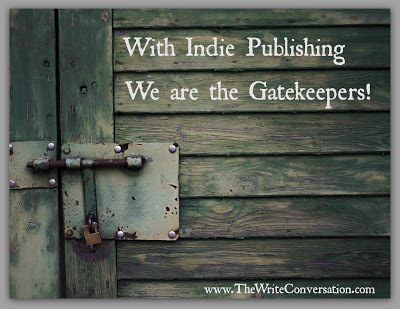 Last Book Ever
Last Book Ever
by Traci Tyne Hilton @TraciTyneHilton
There’s an old myth going around that the indie-path has no gatekeepers.
Sure, there are no acquisition editors standing between you and getting your book in the marketplace, but there are other gatekeepers, and they hold the keys to your success.
The most powerful gatekeeper is probably the book addicted Amazon shopper. If you don’t catch the eye of that reader right off the mark, while you are still a new release, you can almost say goodbye to sales on that title. (Almost. There are ways to turn things around, but it takes hard work and money!)
Despite the make-or-break power of the reader, the most important gatekeeper is you.
I like to say we are our own traditional publishers. We need to be picky. We need to have our own slush piles. We need to know when a book is working and when it needs to be scrapped. The great opportunity of indie publishing is that we are solely responsible for our content. We get all the credit for it, good or bad. To paraphrase a cultural icon: with great opportunity, comes great responsibility.
Every time we open a new file to start a story, we need to ask ourselves: “What would I say if this was the last book I ever got to write?”
 Dr. Laura used to always ask callers if the fight they were about to engage in with their in-laws (or whoever) was “the hill they want to die on.” They could go to war over whose stuffing recipe was spiritually superior, but it might completely kill the relationship, and maybe even the family. So they’d better pick the battle that is worth dying for. (Note: This battle will NEVER be about stuffing. Stuffing is not worth dying for.)
Dr. Laura used to always ask callers if the fight they were about to engage in with their in-laws (or whoever) was “the hill they want to die on.” They could go to war over whose stuffing recipe was spiritually superior, but it might completely kill the relationship, and maybe even the family. So they’d better pick the battle that is worth dying for. (Note: This battle will NEVER be about stuffing. Stuffing is not worth dying for.)
We need to ask ourselves the same thing, every time we write: If I were to be called home the day after I hit “publish” at Amazon (and Nook and iTunes and Kobo) is this the book I will be glad to call my last?
Is this the message I want to leave for my kids? My grandkids? My friends and family?
This question hits close to home for me. I fellowship with a mixed group of writers, secular and Christian. The last book I wrote hit a sour note with early reviewers. I was distraught. Broken hearted. You know, all that emotional writer-stuff. The answer to the problem from my secular writer friends was to give up on the picky Christian audience, pick a pen name, and write stuff without all that religion in it. These friends knew I would make more money. They knew I would have an easier time with reviewers. They knew I wouldn’t get picked apart for being too religious/too irreligious/too wrong-religious, if I didn’t write anything about God at all.
 I entertained the idea for a couple of days. I picked a name. I did a cover mock up. I played with plot and character concepts.
I entertained the idea for a couple of days. I picked a name. I did a cover mock up. I played with plot and character concepts.
And then I asked myself the Big Question. Would I want to go down writing a book that didn’t offer even a glimpse of the hope that comes from knowing God?
I write light cozy mysteries. Escape fiction for rainy La. Something to take your mind off the heavier problems in the world. It’s not theology, and it doesn’t usually have a gospel message. But that doesn’t mean I want to entertain with a godless worldview. I want a little of God’s light to shine through every book I write.
Once I asked myself the Big Question, the answer was easy.
Now I just have to keep asking it as I plot the Christian mysteries. Every plot, every scheme, every murder.
If this is the last book I get to write, is it worth it?
What about you? Does your WIP pass the Big Question test? Is it the book you would write if you only got to write one more book in your life?
TWEETABLE
If this is the last book I get to write, is it worth it? @TraciTyneHilton (Click to Tweet)
With Indie Publishing - We are the Gatekeepers - via @TraciTyneHilton on @EdieMelson (Click to Tweet)
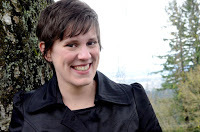 Traci Tyne Hilton is the author of The Plain Jane Mysteries, The Mitzy Neuhaus Mysteries and the Tillgiven Romantic Mysteries. Traci has a degree in history from Portland State University and still lives in the rainiest part of the Pacific Northwest with her husband the mandolin playing funeral director, two busy kids, and their dogs, Dr. Watson and Archie Goodwin.
Traci Tyne Hilton is the author of The Plain Jane Mysteries, The Mitzy Neuhaus Mysteries and the Tillgiven Romantic Mysteries. Traci has a degree in history from Portland State University and still lives in the rainiest part of the Pacific Northwest with her husband the mandolin playing funeral director, two busy kids, and their dogs, Dr. Watson and Archie Goodwin.
More of Traci’s work can be found at www.tracihilton.com
Now back to Traci's fantastic article!
I'm really excited to introduce you to our newest member of The Write Conversation blogging team, Traci Tyne Hilton. I've been a fan of Traci's for a while - I love her cozy mysteries. In addition, I've been looking for someone who knows Indie Publishings. Traci is a perfect fit. Be sure to give her a warm, Write Conversation welcome!!!
 Last Book Ever
Last Book Everby Traci Tyne Hilton @TraciTyneHilton
There’s an old myth going around that the indie-path has no gatekeepers.
Sure, there are no acquisition editors standing between you and getting your book in the marketplace, but there are other gatekeepers, and they hold the keys to your success.
The most powerful gatekeeper is probably the book addicted Amazon shopper. If you don’t catch the eye of that reader right off the mark, while you are still a new release, you can almost say goodbye to sales on that title. (Almost. There are ways to turn things around, but it takes hard work and money!)
Despite the make-or-break power of the reader, the most important gatekeeper is you.
I like to say we are our own traditional publishers. We need to be picky. We need to have our own slush piles. We need to know when a book is working and when it needs to be scrapped. The great opportunity of indie publishing is that we are solely responsible for our content. We get all the credit for it, good or bad. To paraphrase a cultural icon: with great opportunity, comes great responsibility.
Every time we open a new file to start a story, we need to ask ourselves: “What would I say if this was the last book I ever got to write?”
 Dr. Laura used to always ask callers if the fight they were about to engage in with their in-laws (or whoever) was “the hill they want to die on.” They could go to war over whose stuffing recipe was spiritually superior, but it might completely kill the relationship, and maybe even the family. So they’d better pick the battle that is worth dying for. (Note: This battle will NEVER be about stuffing. Stuffing is not worth dying for.)
Dr. Laura used to always ask callers if the fight they were about to engage in with their in-laws (or whoever) was “the hill they want to die on.” They could go to war over whose stuffing recipe was spiritually superior, but it might completely kill the relationship, and maybe even the family. So they’d better pick the battle that is worth dying for. (Note: This battle will NEVER be about stuffing. Stuffing is not worth dying for.)We need to ask ourselves the same thing, every time we write: If I were to be called home the day after I hit “publish” at Amazon (and Nook and iTunes and Kobo) is this the book I will be glad to call my last?
Is this the message I want to leave for my kids? My grandkids? My friends and family?
This question hits close to home for me. I fellowship with a mixed group of writers, secular and Christian. The last book I wrote hit a sour note with early reviewers. I was distraught. Broken hearted. You know, all that emotional writer-stuff. The answer to the problem from my secular writer friends was to give up on the picky Christian audience, pick a pen name, and write stuff without all that religion in it. These friends knew I would make more money. They knew I would have an easier time with reviewers. They knew I wouldn’t get picked apart for being too religious/too irreligious/too wrong-religious, if I didn’t write anything about God at all.
 I entertained the idea for a couple of days. I picked a name. I did a cover mock up. I played with plot and character concepts.
I entertained the idea for a couple of days. I picked a name. I did a cover mock up. I played with plot and character concepts. And then I asked myself the Big Question. Would I want to go down writing a book that didn’t offer even a glimpse of the hope that comes from knowing God?
I write light cozy mysteries. Escape fiction for rainy La. Something to take your mind off the heavier problems in the world. It’s not theology, and it doesn’t usually have a gospel message. But that doesn’t mean I want to entertain with a godless worldview. I want a little of God’s light to shine through every book I write.
Once I asked myself the Big Question, the answer was easy.
Now I just have to keep asking it as I plot the Christian mysteries. Every plot, every scheme, every murder.
If this is the last book I get to write, is it worth it?
What about you? Does your WIP pass the Big Question test? Is it the book you would write if you only got to write one more book in your life?
TWEETABLE
If this is the last book I get to write, is it worth it? @TraciTyneHilton (Click to Tweet)
With Indie Publishing - We are the Gatekeepers - via @TraciTyneHilton on @EdieMelson (Click to Tweet)
 Traci Tyne Hilton is the author of The Plain Jane Mysteries, The Mitzy Neuhaus Mysteries and the Tillgiven Romantic Mysteries. Traci has a degree in history from Portland State University and still lives in the rainiest part of the Pacific Northwest with her husband the mandolin playing funeral director, two busy kids, and their dogs, Dr. Watson and Archie Goodwin.
Traci Tyne Hilton is the author of The Plain Jane Mysteries, The Mitzy Neuhaus Mysteries and the Tillgiven Romantic Mysteries. Traci has a degree in history from Portland State University and still lives in the rainiest part of the Pacific Northwest with her husband the mandolin playing funeral director, two busy kids, and their dogs, Dr. Watson and Archie Goodwin.More of Traci’s work can be found at www.tracihilton.com
Published on October 16, 2015 11:00
October 15, 2015
Is a Writer an Author or an Artist
by Cyle Young @CyleYoung
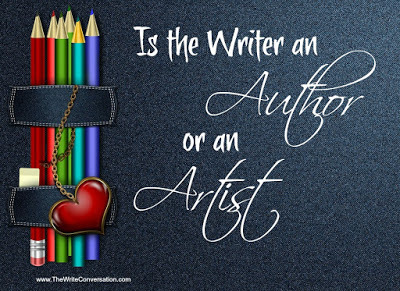 Are you an author or an artist?
Are you an author or an artist?
These words author and artist are not as similar as they sound. Some gifted individuals can be both, but in actuality, most people are one or the other.
In the writing world, these terms are often mutually exclusive of each other. They don’t have to be, but the majority of writer’s fall in one category or another. The rise of independent and self-publishing has widened the gap between the two considerably. Neither is better than the other. It is important for writers to understand in which category they fall, so the ever-changing and always difficult market does not disappoint or devastate them.
An Authoris a person who sells books.Is a writer of many works.Does not care about control of project.Spends days, or weeks, writing a product that sells.Edits once, maybe twice.Spends countless hours crafting “the sell”. Takes weeks to publish a book.Not concerned with perfection.Desires reviews that lead to sells or boost marketability.May never gain recognition or win awards.Will sell books and make money.Is willing to ghost write, with no recognition.These are only some of the many differences between authors and artists. What is important to understand that there is a huge difference, and you need to recognize whether you are an author or artist.
The artist spends a lifetime crafting the perfect novel—their masterpiece. They study, attend conferences, rewrite, and edit until the book is worthy of perceived greatness. An artist’s work is high quality and unique. The book contains the blood, sweat, and tears of the artist. It embodies their soul.
The author treats writing as a business. It’s about the almighty dollar. More books published offer more opportunities for sales. The author writes with ludicrous speed and can publish a book in as little as four weeks. An author creates books that harness current market trends of rides the waves of consumerism.
 In some instances, a writer may exhibit characteristics of both an author and artist, but this is rare. It is usually the result of years of writing practice and experience in the writing world. Beginning writers will lean one way or the other.
In some instances, a writer may exhibit characteristics of both an author and artist, but this is rare. It is usually the result of years of writing practice and experience in the writing world. Beginning writers will lean one way or the other.
It is important to determine in which category you want to be in, and then make adequate changes to your workflow, production, and mindset to allow you to become the author or artist you want to be.
An artist who wants to have the sales of an artist, will often find themselves frustrated, because they have not invested the time and energy to learn how to sell their book.
An author who wants to be respected and win awards, will often find themselves frustrated, because they have not invested enough time learning how to write high-quality works.
A writer’s life isn’t supposed to be frustrating, it should be filled with wonder, discovery, and passion for putting words and stories on paper. Embracing who you are, or who you want to be, will allow you to find your niche in the writing world and help you enjoy an amazing life as an authoror artist.
Which would you classify yourself as? Be sure to leave your thoughts in the comments section below.
Don't forget to join the conversation!
TWEETABLEIs a writer an #Author or an #Artist - via @CyleYoung on @EdieMelson (Click to Tweet)
Cyle Young is thankful God blessed him with the uniqueness of being an ADD-riddled…SQUIRREL!...binge writer. Not much unlike the classic video game Frogger, Cyle darts back and forth between various writing genres. He crafts princess children’s stories, how-to advice for parents, epic fantasy tales, and easy readers.
 Are you an author or an artist?
Are you an author or an artist?These words author and artist are not as similar as they sound. Some gifted individuals can be both, but in actuality, most people are one or the other.
In the writing world, these terms are often mutually exclusive of each other. They don’t have to be, but the majority of writer’s fall in one category or another. The rise of independent and self-publishing has widened the gap between the two considerably. Neither is better than the other. It is important for writers to understand in which category they fall, so the ever-changing and always difficult market does not disappoint or devastate them.
An Authoris a person who sells books.Is a writer of many works.Does not care about control of project.Spends days, or weeks, writing a product that sells.Edits once, maybe twice.Spends countless hours crafting “the sell”. Takes weeks to publish a book.Not concerned with perfection.Desires reviews that lead to sells or boost marketability.May never gain recognition or win awards.Will sell books and make money.Is willing to ghost write, with no recognition.These are only some of the many differences between authors and artists. What is important to understand that there is a huge difference, and you need to recognize whether you are an author or artist.
The artist spends a lifetime crafting the perfect novel—their masterpiece. They study, attend conferences, rewrite, and edit until the book is worthy of perceived greatness. An artist’s work is high quality and unique. The book contains the blood, sweat, and tears of the artist. It embodies their soul.
The author treats writing as a business. It’s about the almighty dollar. More books published offer more opportunities for sales. The author writes with ludicrous speed and can publish a book in as little as four weeks. An author creates books that harness current market trends of rides the waves of consumerism.
 In some instances, a writer may exhibit characteristics of both an author and artist, but this is rare. It is usually the result of years of writing practice and experience in the writing world. Beginning writers will lean one way or the other.
In some instances, a writer may exhibit characteristics of both an author and artist, but this is rare. It is usually the result of years of writing practice and experience in the writing world. Beginning writers will lean one way or the other. It is important to determine in which category you want to be in, and then make adequate changes to your workflow, production, and mindset to allow you to become the author or artist you want to be.
An artist who wants to have the sales of an artist, will often find themselves frustrated, because they have not invested the time and energy to learn how to sell their book.
An author who wants to be respected and win awards, will often find themselves frustrated, because they have not invested enough time learning how to write high-quality works.
A writer’s life isn’t supposed to be frustrating, it should be filled with wonder, discovery, and passion for putting words and stories on paper. Embracing who you are, or who you want to be, will allow you to find your niche in the writing world and help you enjoy an amazing life as an authoror artist.
Which would you classify yourself as? Be sure to leave your thoughts in the comments section below.
Don't forget to join the conversation!
TWEETABLEIs a writer an #Author or an #Artist - via @CyleYoung on @EdieMelson (Click to Tweet)

Cyle Young is thankful God blessed him with the uniqueness of being an ADD-riddled…SQUIRREL!...binge writer. Not much unlike the classic video game Frogger, Cyle darts back and forth between various writing genres. He crafts princess children’s stories, how-to advice for parents, epic fantasy tales, and easy readers.
Published on October 15, 2015 01:00



